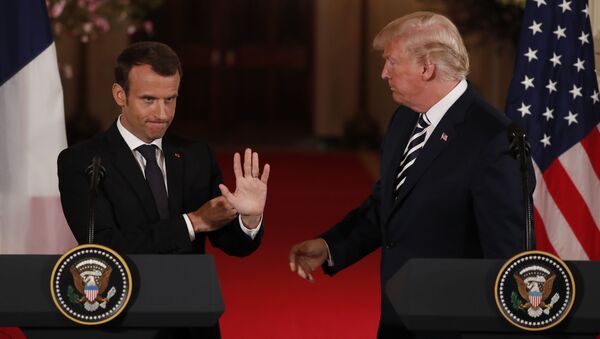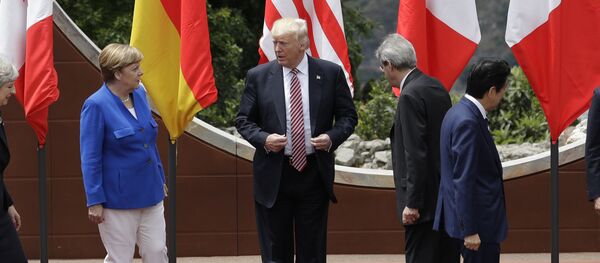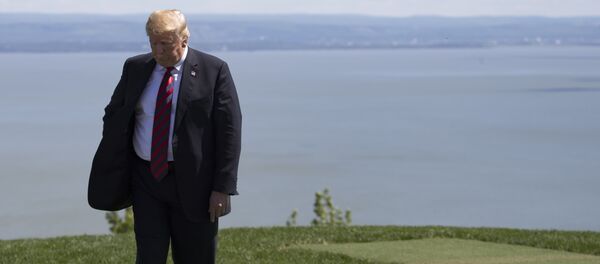According to the US leader the talks have been progressive and contributed to improving trade relations between the US and Canada. Sputnik discussed this issue with Roberto Castaldi, Research Director of International Centre for European and global governance, Director of the Research Centre on Multi-Level Integration and Governance Processes at eCampus University.
Roberto Castaldi: I think that’s a result of the American policy. G7 is supposed to be a meeting between allies and the fact that the trade policy by the union by the Trump-US administration is targeting those supposed allies is creating, obviously, some response both from the European Union side, from Canada and then to a lesser extent from Japan as well. American policy is cremating the G7 format [for coordinating economic and trade policy].
Roberto Castaldi: I think that was very interesting that Russia said it was not very interested and was looking for another kind of format. When the G7 was created it accounted more than half of the world's GDP but today at parity purchasing power it’s about 35% of the world GDP.
The G20 is a much more relevant format for decisions regarding the economy than the G7 is. It’s no longer able to set the rules, set the standards for the world. And the fact that President Putin and President Xi Jinping are meeting at the same time suggests that on the one hand we have the G7, which is very much split, and on the other side there’s a G-group summit meeting which attracts less attention but which is also very relevant for the world.
Sputnik: Obviously, there’s going to be a big focus on trade tariffs and the looming trade war that Donald Trump seems to be interested in promoting. What do you think will be the top issues that are going to be discussed on the second final day?
Roberto Castaldi: Trade is obviously a crucial issue but I don’t think that a deal will be made. There’s been plenty of discussion, bilateral discussion, between the various members and the US in the last few months and eventually the US decided to go along with the tariff on steel and aluminum. But what is at stake is really more of what to do with the international economic order that were created after WW2 and especially what to do with WTO rules.
The point is: are we going to an economic system in which only bilateral transactional relationships are there, or are we going to be able to keep a rule-based multilateral approach to trade like the WTO. So far, the US has been trying to undermine the WTO by vetoing the nomination of the new judges for the arbitration board of the WTO. If this continues for another 1.5 years we won’t have enough judges any more to reach a minimum number and the whole WTO system will collapse.
That’s one of the crucial issues with the pressure of another countries to have the US on board so that the WTO system doesn’t collapse.
Roberto Castaldi: It is, in as far as there isn't any other. Without the WTO any trade contention will turn into trade war with tariffs and reaction like we’re seeing today with the US. Trade is a significant element to ensure global growth. If trade was significantly put to a halt or decreased by increasing tariffs and barriers, that would be very bad in general for the world economy and especially for the developing countries.
One of the things that people tend to forget, especially in the West, is that while globalization may have increased overall imbalances between the top tier and the lower tier of the world population, it has also spurred a lot of growth in the developing countries. The development that was going on in Southeast Asia, across Latin America and to a lesser degree in Africa is very much lean to the openness of the world economy and world trade.
Sputnik: One of the key topics on the agenda is going to be obviously Iran and do you think there’re going to be any changes in the European approach?
Roberto Castaldi: The EU is trying all it can to save the agreement but the truth is that there’s little leverage in the sense that in the end the decision is much more on individual European companies than on the European Union and its member-states.
The fact that Iran is anyway a much smaller economy than the US means that for many big economic players, it’s not worth the risk to stay in Iran if they risk losing assets or being penalized within the American market.
Sputnik: And actually we’ve seen some European companies already saying that they are not going to continue working with Iran in the light of Donald Trump’s pulling out of the JCPOA.
Roberto Castaldi: Unless the EU is willing and able to compensate those companies, but it’s very difficult to do so because once you lose market share in such a big market as the US you may get maybe an economic compensation but in a long term you are losing out because it would be difficult to get back those market shares in the future. So even with compensation it’s difficult to convince a big economic player to stay in Iran unless the US changes its course.
Sputnik: Another thing we have is the Shanghai cooperation organization summit which is also taking place, and many analysts think that’s actually a more important summit than the G7. What’s your take on that?
Roberto Castaldi: Much depends on what decisions are taken at each summit. We’re going into a more multipolar world and the issue is who is willing and able to provide proposals to provide public goods, to work with public goods regarding the functioning of the market, coping with environmental challenge.
When this format is able to foster a sense of responsibility and cooperation among the members that can contribute to the solution of world problems, then they will rise in the relevance and attention of the public in the world.
The views and opinions expressed by Roberto Castaldi are those of the speaker and do not necessarily reflect Sputnik's position.






